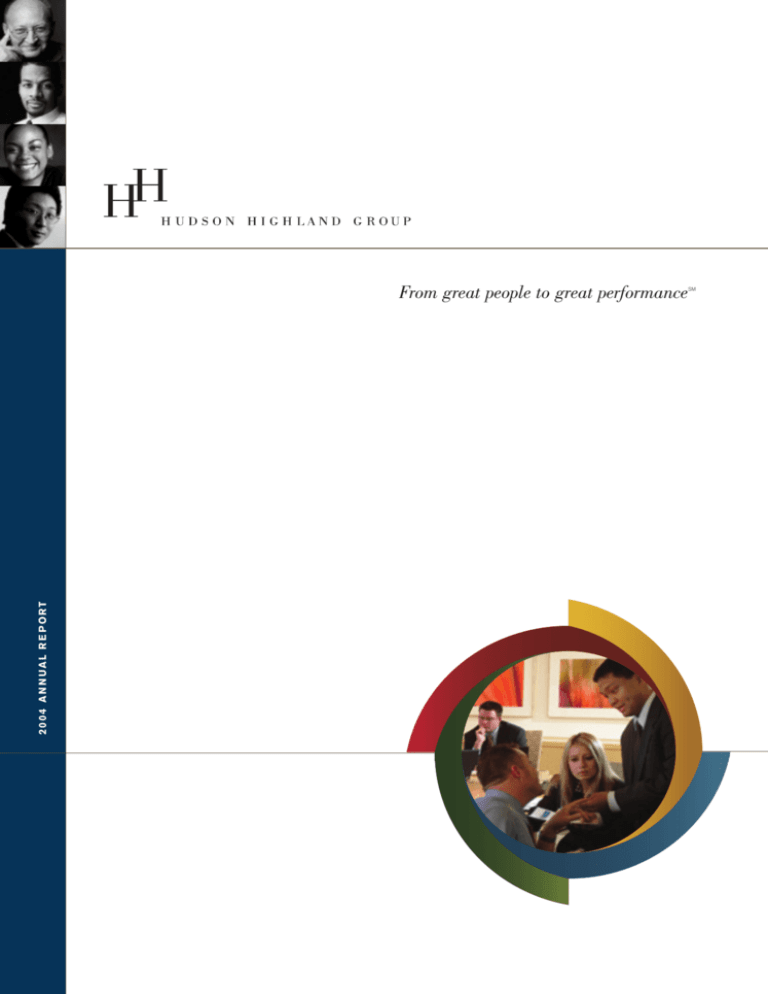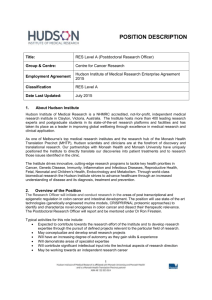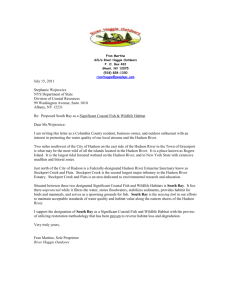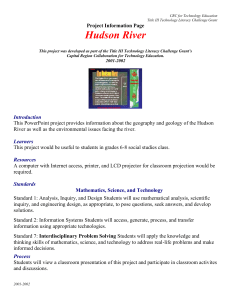annual report wgrid - Corporate-ir
advertisement

From great people to great performance 2 0 0 4 A N N UA L R E P O R T SM Profile Hudson Highland Group, Inc. Hudson Highland Group (NASDAQ: HHGP) is one of the world’s leading professional staffing, retained executive search and human capital solution providers. We help our clients achieve greater organizational performance by assessing, recruiting and developing the best and brightest people for their businesses. Our approximately 3,800 employees in more than 20 countries are dedicated to providing unparalleled service and value to our clients. More information about Hudson Highland Group is available at www.hhgroup.com. Contents 1 Our Value Proposition 2 Letter to Shareholders 4 Growing Global Forces on Employment 8 Helping Clients Win the Talent War 12 Directors, Officers and Corporate Information Our Value Proposition SELECT From great people to great performance SM This is what we do at Hudson Highland Group: We help clients achieve greatness through great people. Because everyone – our clients as well as their competitors – knows that the key to achieving sustainable business performance is AT T R A C T ENGAGE in attracting, motivating and keeping the best talent. This is what makes us different: our focus on the totality of human asset management. We’re structured to do more than find and recruit the right people – we place equal emphasis on helping clients engage and develop them. DEVELOP The HHG People/Performance Continuum represents a seamless integration of human and business performance. Letter to Shareholders 2004 Financial Highlights Revenue (in thousands) Hudson Highland Group made significant progress in 2004 and we are proud of the contributions from all of our employees in achieving those results. $350,000 300,000 250,000 200,000 150,000 100,000 50,000 0 Q1 2003 Q2 Q3 Q4 2004 Gross Margin (in thousands) $140,000 120,000 100,000 80,000 60,000 40,000 20,000 0 Q1 2003 Q2 Q3 Q4 Revenue of $1.256 billion in 2004 was a 15.8 percent increase from $1.085 billion in 2003. Gross margin reached $470.2 million, or 37.4 percent of revenue, up 16.7 percent from $403.0, or 37.1 percent of revenue, for last year. The company reported a net loss of $26.8 million, or $1.38 per basic and diluted share, compared with a net loss of $328.8 million (including a goodwill impairment charge of $202.8 million), or $19.58 per basic and diluted share, for 2003. $100,000 80,000 60,000 40,000 20,000 0 Q1 Q2 Q3 Q4 2004 Gross Margin by Geography Europe 40% North America 28% Asia Pacific 32% 2 Our 2004 results largely reflect the repositioning of the business since the spin-off from Monster Worldwide on April 1, 2003 and improvement of the employment market in key geographies worldwide. We are beginning to realize the operating leverage of our business model, and believe we are well positioned entering 2005 to improve profitability. While we have taken major steps forward, we are acutely aware of all that still must be done to become the pre-eminent global employment services firm. 2004 Revenue per Employee 2003 During the year, we stabilized the business, approached operating profitability, and delivered strong gross margin and revenue growth. We introduced core operating metrics, productivity measures and corporate values, and moved closer to providing a superior employment experience for our people. As a professional services organization, our relationship with our employees is particularly critical to providing excellent client service, building our brand and achieving our financial goals. The early investments in people and offices for our Hudson North America business began paying off in 2004. This regional unit achieved significant improvement in all key measures of financial performance – revenue and gross margin growth, gross margin percentage, bill rate per hour, placements made, contractors on billing and overall profitability. Market leader Hudson Australia/New Zealand delivered significantly higher profit on slightly lower revenue and gross margin. This region of the world has experienced a long, uninterrupted period of solid economic growth and widespread candidate shortages that should drive further demand for our recruitment services. While still relatively small compared with other regional businesses, Hudson Asia achieved strong revenue and profitability growth through a primary focus on mid- and senior-level permanent recruitment services for U.S.-based multi-national corporations operating in Shanghai, Hong Kong, Singapore and Tokyo. Hudson Europe achieved significantly better results on modest revenue growth, primarily stemming from permanent recruitment, contract staffing and employment lifecycle solutions. Importantly, a number of actions were taken during the year which should position this operation for improved profitability in 2005 despite sluggish economic growth in continental Europe. Highland Partners achieved a dramatic turnaround in 2004. We believe it is the leading global boutique in executive search today, successfully competing for major C-level search assignments against larger and better known competitors. During the year, nearly 40 percent of the partners achieved at least $1 million in billings and the average partner billing level was more than $900,000, comparing favorably with the highest levels of performance in the industry. Hudson Highland Group’s long-term profitability goal is to achieve a sustainable EBITDA* margin in the range of 7-10 percent. We plan to achieve this by remaining tightly focused on the execution of our longer-term strategy: • Increase the proportion of temporary professional staffing revenue globally to create a more predictable earnings stream; • Focus on core recruitment and solutions practices with high-margin, high-client impact potential on a global basis – including Accounting & Finance, Legal and IT – supported by strong intellectual capital and knowledge leadership for each; • Invest in building a globally scalable employment lifecycle solutions set – assessment and performance management tools in particular – and more directly link to our recruitment service offerings when and where they add value to our clients; • Establish recruitment and retention programs for our own people that help ensure the consistent selection of the brightest and best-fit individuals for our business, their development and ultimate retention; and • Develop consistent service offering delivery and business processes worldwide to help drive a truly global employment services firm and winning global brand. As we execute on this plan, we will strive to keep our clients strategically prepared for major, emerging human capital issues in the workplace. For your benefit, in this report we showcase some of those issues together with ways that we are helping our clients prepare for or address them. With the continued dedication of all of our employees and the valuable counsel of our Board of Directors, we are confident of building over time an enviable force in the global employment services industry. Jon F. Chait Chairman and Chief Executive Officer Richard W. Pehlke Executive Vice President and Chief Financial Officer * Earnings before interest, income taxes, depreciation and amortization 3 G LOBAL F OR CE S U.S. Census Projections (percent of total population) Asian American/ Pacific Islander 3.9% Hispanic 11.4% Asian American/ Pacific Islander 6.6% Hispanic 18.9% Black 12.2% American Indian/ Alaska Native .7% White 71.8% 2000 White 60.5% Black 13.1% American Indian/ Alaska Native .8% Projected 2030 U.S. Census projections for the next 30 years show the changing face of America. The percentage of Caucasians is declining, while African American, Hispanic and Asian American populations are growing. Source: U.S. Department of the Interior 4 Growing Global Forces on Employment As one of the world leaders in employment services, Hudson Highland Group has a unique perspective from which to observe the societal, demographic and economic trends affecting both employers and employees. The most significant of these trends — an aging global workforce, the growing importance of organizational diversity, outsourcing and offshoring — are all facets of a single, overarching issue facing employers: the competition for talent. AG I N G In the developed world, the aging workforce is an important contributing factor in the growing imbalance between labor supply and demand. According to the United Nations Department of Economic and Social Affairs, the median age in developed countries rose from 28.6 years in 1950 to 37.4 years in 2000 and is projected to be 46.4 years by 2050. The aging of the overall population parallels a similar rise in the age of workers. In the United States, for example, the median age of the labor force is steadily increasing, from 34.8 years in 1978 to a projected 40.7 years in 2008, according to the Bureau of Labor Statistics. Even more striking is the growing proportion of people approaching retirement age. The European Union reports that those 65 years of age and older will reach 22.4 percent of that continent’s total population by 2025, up from 15.4 percent in 1995. In Australia, experts say there will be just two people of working age for every person 65 and older within 30 years. These trends in part can be attributed to the “baby boom” generation, which will begin retiring in 2010. The “baby bust” that follows likely will result in a gap between the number of jobs available and workers to fill them. The Employment Policy Foundation estimates that the U.S. labor shortage could amount to 35 million by 2030. D IVE R S ITY These and other demographic trends point to the need for companies to develop a more effective diversity strategy to access talent from all segments of the labor force. By 2008, experts predict that almost 70 percent of new entrants into the U.S. workforce will be women, people of color and immigrants. Similarly, in the United Kingdom, women owners account for nearly one third of all business start-ups today. Buying power (disposable personal income) among minority groups is growing rapidly, at a much faster rate than their population growth. In the United States, it nearly doubled during the last decade to $1.3 trillion a year, according to the Selig Center for Economic Growth at the University of Georgia. Between 1990 and 2003, the buying power of African Americans increased 116 percent to an estimated $688 billion; Asian American buying power increased 191 percent, to $344 billion; and Hispanic buying power grew 194 percent, to about $652 billion. 5 G LOBAL F OR CE S Total Number of U.S. Jobs Moving Offshore 3.4 Millions of jobs 3.50 1.7 1.75 0.8 0.1 0 2000 2005 2010 By 2015, an estimated 3.4 million U.S. jobs will move to lower-cost countries. Source: Federal Reserve Bank of Kansas City 6 2015 The New York Times recently reported that organizations are more successful in diversity recruitment efforts than in career development and retention programs. Nevertheless, there has been progress. Nearly 60 percent of S&P 500 companies have staff members dedicated to diversity management; 92 percent offer diversity training; 30 percent have mentoring programs; and 24 percent offer development opportunities for women and people of color. These factors, combined with emerging global markets, underscore the importance of more diverse workforces, suppliers and markets. Companies are realizing that to gain competitive advantage on the human capital front, they need to incorporate the concept of diversity recruitment, development and retention into every operation, system and process. OUTSOU RCI NG AN D OFFS HOR I NG Whether across the world or down the block, outsourcing non-core functions is a well-established practice. Today, recruitment is one of the newest and fastest growing areas of functional outsourcing. The highly competitive business environment demands better hires with fewer resources, often in compressed timeframes. Organizations are trying to achieve greater cost savings by transitioning from a fixed cost to a variable cost recruitment model. In addition, human resource departments are increasingly asked to demonstrate how staffing and recruitment add tangible value to the company. Despite the threat of political backlash, corporations are increasingly transferring tasks to lower-cost countries overseas – popularly known as offshoring – either by contracting with another firm or establishing their own facilities. Countries such as India, China and Eastern Europe offer large numbers of highly skilled, lower-wage workers and the potential of increased productivity. Once limited to low-level manufacturing jobs, offshoring is now affecting white-collar workers in a wide range of industries. An economic review produced by the Federal Reserve Bank of Kansas City estimated that 103,000 service jobs moved offshore in 2000 and reported a predicted cumulative job loss by 2015 of 3.4 million. Leading global investment bank Goldman Sachs estimates that the United States has lost one million manufacturing jobs in the past three years to offshoring. In Western Europe, jobs moved offshore will reach 1.2 million by 2015. In general, the growing skilled labor shortage will have far reaching economic and social consequences globally. Finding and attracting the right people from a diminishing talent pool indeed will be a daunting challenge for employers. 7 H E LPI NG CLI E NTS “The goal of the Assessment Centers is to identify the people for our clients who will create added value now and in the future.” – Marc Timmerman, director, Hudson Human Capital Solutions 8 Helping Clients Win the Talent War With the skilled labor pool shrinking, the ability of companies to effectively manage employees throughout the entire employment lifecycle – from attracting and selecting the right candidates, to engaging and developing workers, to transitioning them into new careers as needed – is more critical than ever today. Using a variety of techniques and sophisticated tools, Hudson Highland Group helps clients get the maximum return on their investment in people. ASS E SS M E NT Employers increasingly recognize that the best job candidates possess not only the traditional “hard” skills, but “soft” intangible qualities as well. Hudson typically begins an engagement by thoroughly assessing how closely a candidate’s competencies match the hard and soft requirements of the client’s position. “The goal of our Assessment Centers is to identify the people for our clients who will create added value now and in the future,” said Marc Timmerman, director of Hudson Human Capital Solutions. In some instances, the same methodology is applied to an existing work group or executive team for the purpose of succession planning or career development. A major European-based beverage distributor recently engaged Hudson to provide career assessment and development services for its top 250 global executives. R ECR U ITM E NT OUTSOU RCI NG Hudson provides both on-site and off-site recruitment solutions for clients, ranging from creating job requisitions to ensuring that new employees get off to a good start. The company provides metrics on factors such as time to fill, cost per hire, quality of hire and hiring manager satisfaction. “If it currently takes 90 days to fill a position, and we can fill it in 45 days and reduce turnover, that gives HR a measurable value point that can be translated into revenue,” said Jeff Anderson, senior vice president of Hudson Workforce Solutions. Last year, a major, global consumer electronics company came to Hudson for help after determining that its U.S. recruitment efforts could be more effective. To date, nearly 1,000 professionals have been recruited through Hudson’s on-site team, comprised of nine individuals at client locations nationwide. S P E C I A LT Y S TA F F I N G Clients across multiple industries and functional areas who need project-based recruiting also can turn to Hudson. For example, a major engineering and infrastructure design company needed “heavy lifting” — sourcing and screening of candidates who were willing to work both domestically and under hostile conditions in Iraq, where it is a key contractor rebuilding that country’s infrastructure. Hudson qualifies, screens and prepares candidates to send to the company’s internal hiring staff. B US I N E SS SOLUTION TEAM S To help meet client needs, Hudson also draws from a growing cadre of self-employed, highly specialized professionals in various functional areas such as accounting and finance, legal, information technology, sales and marketing, and human resources. In the legal arena, Hudson helps major corporations reduce their legal costs up to 50 percent or more by sourcing and delivering contract 9 H E LPI NG CLI E NTS “If it currently takes 90 days to fill a position, and we can fill it in 45 days and reduce turnover, it gives HR a measurable value point that can be translated into revenue.” – Jeff Anderson, senior vice president, Hudson Workforce Solutions 10 attorneys and legal specialists for both shortand long-term projects. In 2004, for example, Hudson supplied more than 300 lawyers to two Fortune 50 corporations in connection with various litigation matters, and has recently been engaged to supply 300 lawyers to a large, global organization in connection with merger due diligence. Hudson mobilizes systems architects, software developers and project managers to outsource large-scale enterprise systems implementations and entire IT departments. As an example, Hudson provides enterprise resource planning (ERP), systems integration, help desk and network management, shop floor systems, and applications and infrastructure support to one of the world’s largest steel manufacturers. The increasing importance of auditor independence rules is forcing employers to look for new sources of expertise for accounting and finance projects. Hudson Financial Solutions, one of the company’s fastest growing practice areas, draws both on its own core group of experienced professionals and a large network of independent experts in areas such as risk management, due diligence, and Sarbanes-Oxley compliance. Hudson is developing online communities for these consultants to stay in touch with them during and between projects. Beyond helping to increase loyalty to Hudson, the Web sites will provide industry-specific and technical information accessible to those working on a particular project. “The biggest complaint of virtual consultants is that they don’t feel like they are part of an organization. Building an online community allows us to provide continuing linkage with these highly skilled individuals,” said Dee Lonn, executive vice president of Hudson Financial Solutions. G LOBAL R E CR U ITM E NT S OLUTI ON S Today’s employers may have special employment needs or skill gaps to fill literally anywhere in the world. Hudson, which has offices in more than 20 countries, handles assignments that have ranged from staffing customer call centers in China for a U.S.-based global IT consultancy to hiring workers for a high-tech plant owned by a Scottish company expanding into the United States and Eastern Europe. EXECUTIVE S EARCH High-level client relationships within Highland Partners, the leading global boutique in C-level retained executive search, can help enable the cross-selling of services between Hudson Highland Group’s business units. This past year the firm signed a master services agreement to identify and select senior management talent for a leading computer marketer with plans to open 12 new sites, and hire 135 new executives and 700 managers, over the next two years. E M P L OY M E N T L I F E CYC L E S O L U T I O N S Once an employee is on board, an effective performance management system helps ensure that the individual’s effort is aligned with the interests of the business, its customers and shareholders. Hudson’s TalentMax™ software is a Web-based application that helps focus employees on what matters most to the business while clarifying the competencies that drive success. “Clients often call us because they want to establish clear performance expectations and improve the retention rate of their top people,” said Garrett Sheridan, vice president and practice leader, Hudson Human Capital Solutions in North America. “It’s all about getting the most from your people by building a performance culture that rewards success.” 11 Corporate Information Directors Jon F. Chait – Chairman and Chief Executive Officer, Hudson Highland Group, Inc. (a) John J. Haley – President and Chief Executive Officer, Watson Wyatt & Company (b) (c) (d) Jennifer Laing – Associate Dean, External Relations, London Business School (c) Nicholas G. Moore – Director, Bechtel Group, Inc. (b) (c) Neil J. Funk – Vice President, Internal Audit* Steven B. London – Vice President and Global Treasurer* Ralph L. O’Hara – Vice President and Global Controller* Latham Williams – Vice President, Legal Affairs and Administration, Corporate Secretary* * Executive Officer Business Divisions David G. Offensend – Senior Vice President, Chief Financial and Administrative Officer, The New York Public Library (a)(b)(c)(d) Richard W. Pehlke – Executive Vice President and Chief Financial Officer, Hudson Highland Group, Inc. (a) René Schuster – Global Marketing Director, Vodafone Group, PLC (d) (a) 2005 Executive Committee (b) 2005 Audit Committee (c) 2005 Compensation Committee (d) 2005 Nominating and Governance Committee Officers and Executive Management Corporate Jon F. Chait – Chairman and Chief Executive Officer* Richard W. Pehlke – Executive Vice President and Chief Financial Officer* Margaretta Noonan – Executive Vice President and Chief Administrative Officer* Richard S. Gray – Senior Vice President, Marketing and Communications* Richard A. Harris – Senior Vice President and Chief Information Officer* Laurent Chen – Vice President, Business Applications and Operations Support Hudson Asia Pacific Bob Goodman – Chairman Australia/New Zealand Anne Hatton – President Asia Gary Lazzarotto – Chief Executive Officer Europe Christine Raynaud – President and President, Hudson Human Capital Solutions North America Thomas B. Moran – President Highland Partners Michael T. Kelly – Chairman John Wallace – President and Chief Executive Officer Strategic Business Services Group Donald E. Bielinski – President Annual Meeting The annual meeting of Hudson Highland Group, Inc. will be held on Friday, May 6, 2005, at 10:00 a.m., local time, at the Hudson Highland Group, Inc. corporate headquarters, 622 Third Avenue (between 40th and 41st street), 38th Floor, New York, NY 10017. Shareholder Information Form 10-K for the year ended December 31, 2004 (without exhibits), as filed with the Securities and Exchange Commission, accompanies this Hudson Highland Group report and, together with this report, constitutes Hudson Highland Group’s 2004 Annual Report to Shareholders. Investor Information/ Quarterly Reports For quarterly earnings reports, press releases and other investor information, please visit our Web site at www.hhgroup.com or e-mail your inquiries to investor.relations@hhgroup.com. Common Stock Hudson Highland Group, Inc. common stock is listed on the Nasdaq National Market under HHGP. Transfer Agent and Registrar The Bank of New York Shareholder Relations Dept. P.O. Box 11258 Church Street Station New York, NY 10286 800-524-4458 www.stockbny.com Independent Auditors BDO Seidman, LLP 330 Madison Avenue New York, NY 10017 Hudson Highland Center for High Performance Susan Lucia Annunzio – Chairman and Chief Executive Officer Legal Counsel Hudson Human Capital Solutions Bob Goodman – Chairman Corporate Headquarters Hudson Inclusion Solutions Billy Dexter – President Foley & Lardner LLP 777 East Wisconsin Avenue Milwaukee, WI 53202 Hudson Highland Group, Inc. 622 Third Avenue 38th Floor New York, NY 10017 Tel: 212-351-7300 www.hhgroup.com Forward-Looking Statements This report contains statements that the company believes to be “forward-looking statements” within the meaning of the Private Securities Litigation Reform Act of 1995. All statements other than statements of historical fact included in this report, including statements regarding the company’s future financial condition, results of operations, business operations and business prospects, are forward-looking statements. Words such as “anticipate,” “estimate,” “expect,” “project,” “intend,” “plan,” “predict,” “believe” and similar words, expressions and variations of these words and expressions are intended to identify forward-looking statements. All forward-looking statements are subject to risks and uncertainties that could cause actual results to differ materially from those described in the forward-looking statements. These factors include, but are not limited to, the impact of global economic fluctuations on temporary contracting operations; the cyclical nature of the company’s executive search and mid-market professional staffing businesses; the company's ability to manage its growth; risks associated with expansion; the company’s reliance on information systems and technology; competition; fluctuations in operating results; risks relating to foreign operations, including foreign currency fluctuations; dependence on highly skilled professionals and key management personnel; the impact of employees departing with existing executive search clients; risks maintaining professional reputation and brand name; restrictions imposed by blocking arrangements; exposure to employment-related claims, and limits on insurance coverage related thereto; government regulations; and restrictions on the company’s operating flexibility due to the terms of its credit facility. Additional information concerning these and other factors is contained in the company’s filings with the Securities and Exchange Commission. These forward-looking statements speak only as of the date of this report. The company assumes no obligation, and expressly disclaims any obligation, to update any forward-looking statements. 12 From great people to great performance NA.25000.03/05 Asia Pacific | Europe | North America www.hhgroup.com SM





